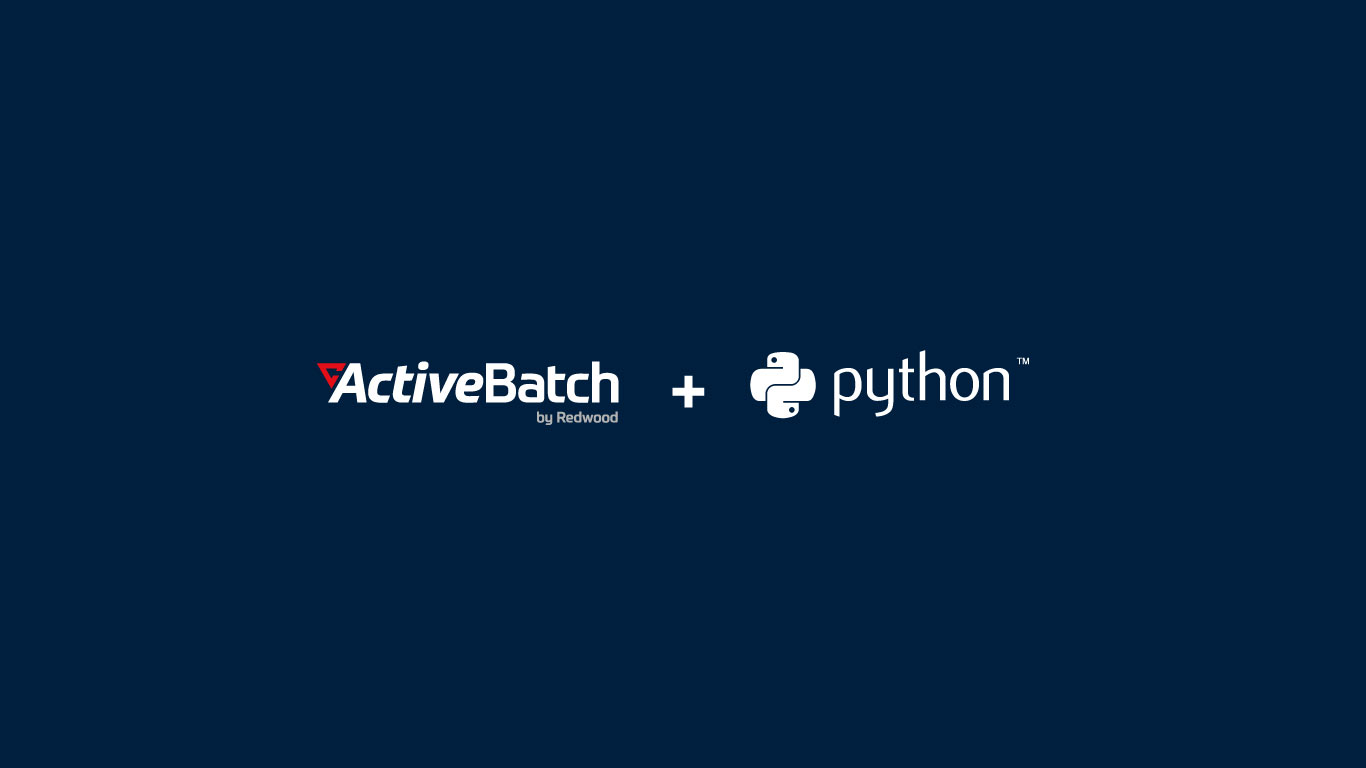The power of ETL automation tools and Python
Learn about benefits of ETL automation and how to power up your ETL processes with Python and the right workload automation tool.

When most people think about data science and data analytics, the logistics of the process are abstract. Foundationally, these practices are about looking at data to make better decisions and predict outcomes. But how does the information move from one place to another, and how does it transform to become readable for data engineers and company leaders? This is where ETL comes in.
Extract, transform, load (ETL) processes are fundamental for efficient data management — they enable the movement and transformation of data from various sources into a data warehouse.
Automating ETL processes can enhance efficiency and accuracy by reducing manual intervention and minimizing errors. ETL automation tools streamline data integration and processing to simplify the management of large volumes of data and complex workflows.
Understanding ETL automation tools
ETL automation tools streamline the ETL process. They extract data from various sources, transform it into a suitable format and load it into a data warehouse. These tools automate repetitive tasks, reduce manual errors and enhance data processing speed.
Along with helping organizations handle data more efficiently, they ensure the accuracy and reliability of data integration processes. They also perform various data transformations, from simple data cleaning and formatting to complex aggregations and calculations. Some ETL automation tools have advanced features such as scheduling and workflow orchestration.
Automating ETL processes offers numerous advantages over manual methods. Manual processes are time-consuming and prone to human error, thus compromising data quality and slowing decision-making. With ETL automation tools, you get a consistent, repeatable, error-free data integration method that generates reliable business intelligence.
ETL automation capabilities
The following are some notable capabilities of ETL automation tools.
Scheduling and orchestration
Scheduling and orchestration features allow organizations to automate the execution of ETL workflows at specified times or in response to specific events. This capability ensures that data is consistently updated and processed without manual intervention. Advanced scheduling options like time-based triggers and event-driven workflows enable seamless data integration and continuous data processing. This leads to timely and reliable data availability, supporting better business decisions. Workflow orchestration enables on-time ETL task completion and complex data integration.
Error handling and monitoring
Error handling and monitoring are crucial for maintaining data integrity and continuity. ETL automation tools can automatically detect and manage errors, reducing the risk of data corruption and ensuring smooth operations. Real-time alerts and detailed logs allow teams to identify and resolve issues quickly. This proactive approach to error management enhances data reliability and minimizes disruptions in data workflows.
Scalability
ETL automation tools can handle large datasets and complex transformations efficiently and are designed to scale with the growth of data and the increasing complexity of data processes. They support parallel processing and distributed computing to ensure high performance and quick processing times, even with large volumes of data. This makes them suitable for businesses of all sizes.
Integration
Unified data sources are essential for attaining a comprehensive view of your data landscape. Robust integration capabilities support this by connecting to databases, APIs, flat files and cloud services to simplify data migration and ensure compatibility with various data formats.
Popular ETL automation tools
The right ETL automation tool for your organization will be able to handle the complexity of your data workflows and your specific scalability and integration needs. Below are summaries of several you might consider evaluating.
Apache Airflow
Apache Airflow is an open-source tool that excels in workflow automation and orchestration, making it a popular choice for ETL processes. Its modular architecture and extensive plugin library provide flexibility in designing and managing complex workflows. Apache Airflow’s ability to integrate with various data sources and its powerful scheduling capabilities make it a preferred choice for data engineers.
Bonobo
Bonobo is a lightweight and easy-to-use ETL tool suitable for small to medium-sized data workflows. Its simple and intuitive design allows for quick setup and execution of ETL processes. Despite its simplicity, Bonobo offers robust features for data extraction, transformation and loading, making it a practical choice for organizations with less complex data integration needs.
Apache NiFi
Apache NiFi is a highly flexible and scalable ETL tool that supports real-time data processing and integration. Its visual interface allows users to design data flows easily, and its robust scheduling and monitoring features ensure that data is processed efficiently. Apache NiFi’s ability to handle large volumes of data in real time makes it a good fit for dynamic and fast-paced data environments.
Informatica
Known for its robust data integration capabilities, Informatica provides comprehensive ETL solutions for various industries. Its powerful data transformation features and extensive connectivity options make it ideal for complex data environments. Informatica also offers advanced data governance and security features, ensuring that data is managed safely and complies with industry standards.
Talend
Talend is an open-source ETL tool that offers a wide range of data integration and management features. Its user-friendly interface and extensive library of pre-built connectors make it easy to integrate data from multiple sources. Talend also supports big data and cloud integration, making it a versatile choice for organizations looking to modernize their data infrastructure.
Using Python for ETL processes
Python is a versatile programming language known for its readability and extensive library support. It’s become a popular choice for ETL due to its flexibility and applications for creating custom, scalable data workflows. Python ETL offers powerful tools and libraries for handling data, so it’s ideal for various data processing needs.
Python’s simplicity and readability also contribute to its widespread adoption in data engineering and data science communities.
Advantages of using Python for ETL
Python is flexible — it allows developers to write custom scripts tailored to specific data processing needs for more precise control over data workflows. This flexibility is particularly beneficial when dealing with complex or non-standard data transformations. Developers can easily manipulate data structures, apply intricate transformation logic and integrate additional processing steps that may not be straightforward with traditional ETL tools.
Python’s extensive ecosystem of libraries and tools supports a wide range of data sources and formats. Whether you’re working with SQL databases, APIs, CSV files or cloud services, Python has the tools to connect and integrate various data sources. Libraries like SQLAlchemy for database connections, Requests for API interactions and Pandas for data manipulation make it easier to handle diverse data environments. Data engineers can use Python to create comprehensive ETL workflows capable of processing data from multiple sources.
Python’s readability and straightforward syntax reduce the learning curve for beginners to develop and deploy ETL processes quickly. Python code is often described as being close to natural language, which makes it easier to understand and write. This simplicity, combined with powerful functionalities, ensures that even those new to programming can get up to speed quickly. Its active community and extensive documentation provide valuable resources for troubleshooting and optimizing ETL workflows.
Another significant advantage when it comes to ETL is Python’s capability for integration and expansion. It easily interacts with other programming languages and systems, making it an ideal choice for heterogeneous IT environments. For instance, Python can be called Java or C++ programs, integrate with .NET applications and even run R scripts for advanced statistical analysis. This interoperability ensures that Python can fit seamlessly into existing workflows and augment the capabilities of other systems.
Python’s strong support for parallel and distributed computing further enhances its suitability for ETL tasks. Libraries like Dask and PySpark enable the processing of large datasets across multiple processors or even across a distributed cluster of machines. This capability is crucial for handling big data ETL operations, where the volume, velocity and variety of data can be overwhelming for single-threaded applications.
Common Python libraries for ETL
Several Python libraries are commonly used for ETL processes, each offering unique capabilities that cater to data integration and processing aspects. Here are some of the most widely used libraries.
Apache Airflow
Apache Airflow is a robust choice for managing ETL pipelines, as it excels in workflow automation and orchestration. This open-source tool allows users to define and manage workflows as directed acyclic graphs (DAGs), providing a clear visual representation of task dependencies. With Apache Airflow, users can schedule and monitor complex data pipelines, ensuring that each step in the ETL process is executed in the correct order. Its extensive plugin library supports integration with various data sources and services. Apache Airflow’s ability to handle dynamic workflows and monitor real-time tasks makes it a favorite among data engineers.
Bonobo
Bonobo is a lightweight ETL framework designed for ease of use, particularly suitable for small to medium-sized data workflows. It provides a straightforward interface for building ETL pipelines and supports parallel execution. Bonobo’s simplicity does not compromise its functionality; it allows users to extract data from various sources, apply transformations and load the processed data into target systems with minimal coding. Its modular design makes it easy to extend and customize into various data processing scenarios.
Dask
Dask is a parallel computing library that integrates seamlessly with Pandas, providing scalable data processing capabilities. It allows users to handle larger-than-memory datasets by breaking them into smaller chunks and processing them in parallel. Dask’s API is designed to be familiar to Pandas users so they can easily transition from single-machine to distributed computing environments. This makes Dask an excellent choice for scaling ETL workflows that need to process large datasets efficiently.
Pandas
Pandas is one of the most popular Python libraries for data manipulation and analysis. It provides powerful tools for handling structured data. It simplifies tasks such as data cleaning, transformation and aggregation with its intuitive DataFrame objects. These objects allow users to easily manipulate tabular data, perform operations like filtering and grouping and merge datasets. Pandas’ extensive functionality and ease of use make it an essential tool for data engineers and analysts working on ETL tasks.
PySpark
PySpark is the Python API for Apache Spark, a powerful distributed computing system. It is designed to handle large-scale data processing tasks, making it ideal for ETL operations that involve massive datasets. PySpark allows users to leverage Spark’s capabilities, such as in-memory processing and parallel execution, to accelerate data processing workflows. Its integration with the Hadoop ecosystem and support for various data formats (like Parquet, Avro and ORC) enhance its utility in ETL processes. PySpark’s scalability and performance make it a go-to choice for data-intensive applications.
Automating ETL processes with Python and ActiveBatch
ActiveBatch by Redwood is a comprehensive ETL automation tool that leverages the power of Python to simplify and enhance ETL processes. It allows data engineers to design and automate complex ETL workflows using an interactive visual interface or writing Python code.
This workload automation tool is designed to manage complex data workflows efficiently and effectively. ActiveBatch offers a comprehensive suite of features designed to optimize ETL automation.
Workflow automation
ActiveBatch’s workflow automation capabilities enable users to create intricate data processing sequences without manual intervention. This feature ensures consistent and reliable data integration by automating repetitive tasks, reducing the risk of human error and speeding up the data processing cycle. Users can design highly customized workflows using drag-and-drop functionality or through scripting in Python.
Scheduling capabilities
ActiveBatch features advanced scheduling that can execute at specific times or in response to particular events. Users can set up complex schedules with time-based, event-based or conditional triggers to automate ETL processes according to unique business requirements.
Monitoring and error management
Monitoring and error management are crucial for data integrity and continuity. ActiveBatch offers robust monitoring tools that provide real-time insights into ETL workflows, allowing users to track progress, identify bottlenecks and troubleshoot issues promptly. The platform’s error management capabilities automatically detect and handle errors, and users can set up alerts and notifications to be informed of any issues.
Integration with various data sources
ActiveBatch supports integration with various data sources and formats, including SQL databases, APIs, CSV files, XML and cloud services like AWS and Azure. This wide-ranging compatibility allows users to create comprehensive ETL workflows that efficiently process data from multiple sources. Python’s extensive library ecosystem complements ActiveBatch’s integration capabilities with seamless connection to diverse data environments.
Pre-built job steps and templates
The ActiveBatch Integrated Jobs Library offers hundreds of pre-built connectors to simplify data warehousing tasks without writing scripts. These pre-built components cover many ETL tasks, from data extraction and transformation to loading and validation. Users can leverage these templates to quickly build and deploy ETL processes without starting from scratch while incorporating Python scripts.
Scalability and performance
ActiveBatch is designed to handle ETL processes of varying complexity and scale. Its scalable architecture accommodates growing data volumes and increased processing demands. Python’s ability to handle large datasets and complex computations further enhances the performance and scalability of ETL processes managed by ActiveBatch.
Security and compliance
ActiveBatch offers robust security features to protect sensitive data and ensure compliance with industry standards. The platform supports role-based access control, encryption and audit logging to provide a secure environment for data processing. These security measures help organizations meet regulatory requirements and protect data assets from unauthorized access and breaches. Python’s secure coding practices and libraries also contribute to maintaining data security and compliance.
Ready to transform your ETL workflows? Explore how ActiveBatch can meet your automation needs. Experience its powerful capabilities firsthand — sign up for a demo.
ETL automation and Python FAQs
ETL tools are software solutions for managing extract, transform and load (ETL) processes. They automate the movement, transformation and loading of data from various sources into a target data warehouse or database. These tools ensure data is clean, consistent and readily available for analysis, supporting data-driven decision-making.
Modern ETL tools support diverse data environments and use cases, integrating with relational databases like Oracle, cloud services like Amazon AWS and Microsoft Azure and data warehouses like Snowflake. They often feature no-code interfaces for easy workflow management and include capabilities for data testing, validation and regression testing to maintain data accuracy. Advanced tools offer ETL testing automation, metadata management and enforcement of business rules, enhancing the overall data lifecycle and analytics processes.
Learn more about the ETL automation process and ETL testing, including testing tools.
Yes, Python offers various libraries like Pandas, NumPy and petl for data manipulation and transformation. Tools such as Luigi and Apache Airflow automate workflows, while Odo assists in loading data.
Python handles different data formats, including JSON and HTML and works well with command-line interfaces. Its integration with data analysis and visualization libraries enhances ETL processes, providing valuable insights from transformed data. The active Python community and extensive resources on GitHub also offer strong support for ETL tasks.
Learn more about workflow orchestration tools in Python and how it differs from ETL.
Yes, ETL testing can be automated. Tools like iCEDQ and IBM offer features for data validation, checking for duplicates and verifying schema consistency. Automated ETL testing involves creating test cases to validate source data against the target data warehouse, ensuring accuracy and completeness.
These tools often provide user interfaces and dashboards to monitor the testing process and visualize results. Integrating ETL testing into DevOps pipelines enhances data analytics by allowing continuous testing and validation, making it a crucial part of modern data management.
Learn more about IT automation and why it’s becoming increasingly important for digital growth.
Yes, Python can be used for automation testing. Python’s versatility and extensive library support make it ideal for automating various testing tasks. Python ETL tools facilitate data extraction, transformation and loading, streamlining ETL testing processes. Additionally, Python’s machine learning capabilities can enhance automation testing by identifying patterns and predicting potential issues, providing a more robust testing framework.
Python is effective in both on-premises and cloud environments, integrating seamlessly with existing ETL testing tools. Numerous tutorials are available to guide users in implementing Python for automation testing, from basic scripting to advanced techniques. Python’s ability to load data efficiently and handle complex workflows makes it a powerful tool for ensuring the accuracy and reliability of automated testing processes.
Learn More about Python and how it helps streamline repetitive workflows and increase efficiency.







